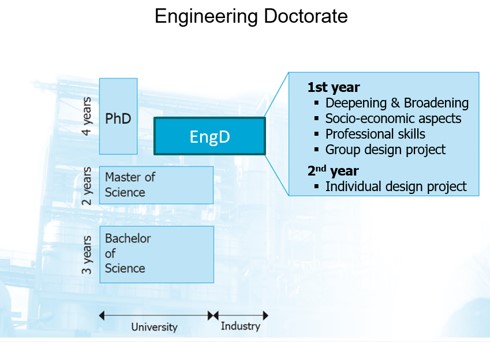What is EngD Product, Process and Equipment Design
The Product, Process and Equipment Design programme is an advanced-level training programme that trains and educates MSc graduates to become certified designers. After a careful selection process, MSc graduates are hired as EngD trainees in a full-time, two-year programme and become salaried employees of the University during that time.
Successful trainees are awarded the degree of Engineering Doctorate (EngD) and may add the abbreviation EngD to their professional title.
a unique way of cickstarting an engineering career
Take advanced courses in product and/or process design, spend a year working on an industrial design problem at a company and solve a practical problem by designing and detailing an industrial process: the Engineering Doctorate is a dream come true for aspiring engineers. It’s also ideal for the innovative companies collaborating with the programme because they need engineering design talent with more than just an MSc degree.
Join this unique programme, where you can apply your technical knowledge to projects with major players in the process industry at a doctorate level. Start your career as an Engineering Doctorate trainee in the Product, Process and Equipment Design EngD programme.
FACTS AND FIGURES
Diploma: Engineering Doctorate
Credits: 120 ECT / 24 Months
Starts in: September/February
Language of instruction: English
Salary: EUR 2618,-
Tuition fees: Not applicable
Job opportunities: 95% after graduation
The certified name of this programme is expected to change from ‘Process & Equipment Design’ to ‘Product, Process & Equipment Design’ by the end of 2024. Until then, the formal designation on the degree remains Process & Equipment Design.
To enhance the level of technological competence in the Netherlands, the Ministries of Education and of Economic Affairs initiated a National Educational Programme for Technological Design. Now part of the 4TU.School for Technological Design, the four Dutch technical universities have offered these two-year post-MSc design programmes at the doctorate level for over 30 years.
In 1990, the Delft University of Technology (TU Delft) started the Process and Equipment Design post-master’s degree programme and, as of 2024, more than 250 EngD graduates have completed this programme.
The advanced-level programme trains and educates MSc graduates to become certified designers, capable of designing innovative, fit-for-purpose products, processes and equipment. It aims to develop the design skills of the trainees to an advanced level. Emphasis lies on the multi-disciplinary area of the design. It encourages the trainees to actively look beyond the perimeters of their own discipline and recognise the challenges and restrictions imposed by product and raw material supply chains, environment, time and money.
The knowledge of the Engineering Doctorate (EngD) trainees is broadened by:
- Studying the latest developments from related technical areas and fields other than engineering and natural sciences
- Emphasising the multi-disciplinary context of the technological design (in teamwork, in breadth of knowledge)
- Integrating knowledge from industrial sciences
Knowledge is deepened by studying a number of specialised subjects, focused on product and process design methodologies and tools, which are the core of the programme.
Recent theories and developments in materials and process technologies for the energy transition and circular chemistry transitions are covered. The acquired knowledge is integrated by working on industrially relevant design case studies during the programme. These case studies enhance the interactions between engineering disciplines (chemical, mechanical, control) and improve the understanding of economic and management aspects of product, process and equipment design and operation.
Teamwork and personal and project management are essential elements of the programme’s training and coaching, as explained below.
The personal interactions and peer/staff reviews during the traineeship accelerate the development of essential professional competencies. These include the improvement of organisational and planning approaches to solving engineering issues, the development of group leadership potential, and the enhancement of oral and written communication skills. Because the EngD trainees are regularly exposed to situations in which they must adopt a position of advocacy on diverse issues, they achieve considerable growth in their professional maturity within a relatively short period.
The programme’s Engineering Doctorate (EngD) graduates are well equipped to develop their careers in the product and process industry (energy sectors, base and speciality chemicals, circularity in chemicals, metallurgical, food industry, pharma and others), as engineering contractors in process plant and equipment engineering, and in construction and technological research institutes. The breadth of their training and coaching ensures that they pursue an innovation and application-oriented career.
The programme prepares participants for careers as professional engineers. The learning objectives of the EngD programme are laid down in Article 5 of the TU Delft Regulation on Engineering Doctorate.
At the start of the traineeship, every Engineering Doctorate (EngD) trainee drafts an individual programme and supervision plan, which depends on skills and interests. The programme consists of compulsory and elective components. Advanced MSc-level subjects are offered for trainees who need to fill any MSc-level gaps. The programme coordinator and the team of supervisors must approve this plan. The individual design project topic and the Assessment Committee will be determined during the second half of the first year.
The trainee’s progress and performance will be assessed after nine months. For admission to the second year, all first-year subjects must be completed. The programme coordinator and the team of supervisors perform this assessment.
- 4TU.SAI: 4TU School for Technological Design Stan Ackermans Institute
- Traineeships Engineering Design (EngD programmes)
- Delft Process & Product Technology Institute (Pro2Tech)
- Faculty of Applied Sciences
- ChemE (Chemical Engineering) Department
- Faculty Mechanical Engineering
- Process & Energy Department
- KIVI (Royal Netherlands Society of Engineers)
- Institute for Sustainable Process Technology (ISPT)
- Technologisch Gezelschap
